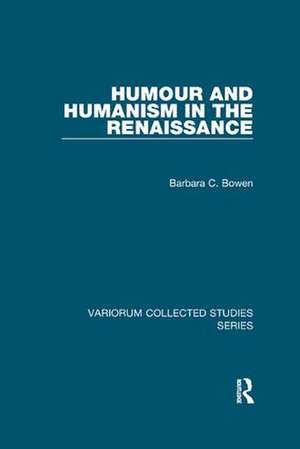Humour and Humanism in the Renaissance: Variorum Collected Studies
Autor Barbara C. Bowenen Limba Engleză Paperback – 10 iun 2019
Din seria Variorum Collected Studies
- 9%
 Preț: 938.85 lei
Preț: 938.85 lei -
 Preț: 311.41 lei
Preț: 311.41 lei -
 Preț: 351.48 lei
Preț: 351.48 lei -
 Preț: 313.38 lei
Preț: 313.38 lei -
 Preț: 386.77 lei
Preț: 386.77 lei -
 Preț: 325.68 lei
Preț: 325.68 lei -
 Preț: 396.00 lei
Preț: 396.00 lei -
 Preț: 312.75 lei
Preț: 312.75 lei - 9%
 Preț: 1041.23 lei
Preț: 1041.23 lei -
 Preț: 258.66 lei
Preț: 258.66 lei -
 Preț: 299.55 lei
Preț: 299.55 lei - 9%
 Preț: 938.08 lei
Preț: 938.08 lei -
 Preț: 343.33 lei
Preț: 343.33 lei -
 Preț: 311.18 lei
Preț: 311.18 lei - 9%
 Preț: 937.13 lei
Preț: 937.13 lei -
 Preț: 351.41 lei
Preț: 351.41 lei -
 Preț: 320.00 lei
Preț: 320.00 lei - 34%
 Preț: 764.20 lei
Preț: 764.20 lei - 22%
 Preț: 312.43 lei
Preț: 312.43 lei - 34%
 Preț: 739.65 lei
Preț: 739.65 lei - 34%
 Preț: 764.20 lei
Preț: 764.20 lei - 34%
 Preț: 680.73 lei
Preț: 680.73 lei - 26%
 Preț: 247.40 lei
Preț: 247.40 lei - 34%
 Preț: 485.78 lei
Preț: 485.78 lei - 34%
 Preț: 764.20 lei
Preț: 764.20 lei - 34%
 Preț: 767.07 lei
Preț: 767.07 lei - 34%
 Preț: 764.20 lei
Preț: 764.20 lei - 34%
 Preț: 769.51 lei
Preț: 769.51 lei - 34%
 Preț: 764.20 lei
Preț: 764.20 lei - 34%
 Preț: 826.68 lei
Preț: 826.68 lei - 25%
 Preț: 225.28 lei
Preț: 225.28 lei - 25%
 Preț: 225.54 lei
Preț: 225.54 lei - 34%
 Preț: 736.38 lei
Preț: 736.38 lei - 34%
 Preț: 738.43 lei
Preț: 738.43 lei - 25%
 Preț: 226.52 lei
Preț: 226.52 lei - 33%
 Preț: 491.66 lei
Preț: 491.66 lei - 34%
 Preț: 485.78 lei
Preț: 485.78 lei - 34%
 Preț: 485.78 lei
Preț: 485.78 lei - 36%
 Preț: 739.17 lei
Preț: 739.17 lei - 38%
 Preț: 766.34 lei
Preț: 766.34 lei - 31%
 Preț: 473.94 lei
Preț: 473.94 lei - 18%
 Preț: 843.61 lei
Preț: 843.61 lei - 38%
 Preț: 774.91 lei
Preț: 774.91 lei - 34%
 Preț: 764.20 lei
Preț: 764.20 lei - 34%
 Preț: 764.20 lei
Preț: 764.20 lei - 51%
 Preț: 485.78 lei
Preț: 485.78 lei - 34%
 Preț: 485.78 lei
Preț: 485.78 lei - 34%
 Preț: 769.10 lei
Preț: 769.10 lei - 38%
 Preț: 766.99 lei
Preț: 766.99 lei - 18%
 Preț: 1019.01 lei
Preț: 1019.01 lei
Preț: 302.36 lei
Preț vechi: 342.99 lei
-12% Nou
Puncte Express: 454
Preț estimativ în valută:
57.86€ • 60.29$ • 47.91£
57.86€ • 60.29$ • 47.91£
Carte tipărită la comandă
Livrare economică 03-17 aprilie
Preluare comenzi: 021 569.72.76
Specificații
ISBN-13: 9781138375642
ISBN-10: 1138375640
Pagini: 314
Dimensiuni: 150 x 224 mm
Greutate: 0.59 kg
Ediția:1
Editura: Taylor & Francis
Colecția Routledge
Seria Variorum Collected Studies
Locul publicării:Oxford, United Kingdom
ISBN-10: 1138375640
Pagini: 314
Dimensiuni: 150 x 224 mm
Greutate: 0.59 kg
Ediția:1
Editura: Taylor & Francis
Colecția Routledge
Seria Variorum Collected Studies
Locul publicării:Oxford, United Kingdom
Cuprins
Contents: Preface; Humanist Wit: Renaissance collections of facetiae, 1344-1490: a new listing; Renaissance collections of facetiae, 1499-1528: a new listing; Roman jokes and the Renaissance prince, 1455-1528; Ciceronian wit and Renaissance rhetoric; The collection of facezie attributed to Angelo Poliziano; Paolo Cortesi's laughing cardinal; Festive humanism: the case of Luscinius; Rabelais: Rire est le propre de l'homme; Rabelais's Panurge as homo rhetoricus; Rabelais et le propos torcheculatif; Lenten eels and Carnival sausages; Bragueta juris: notes sur Rabelais et le droit; Rabelais and the Library of Saint-Victor; Janotus de Bragmardo in the limelight (Gargantua, ch. 19); Rabelais and Folengo once again; French Humanist Humour: 'Honneste' et sens de l'humour au XVIe siècle; Facétie/sententia/apophtegme: les Divers propos memorables de Gilles Corrozet; Tabourot facetus: le sieur Gaulard; 'Lasciuetez' et scatologie: la rhétorique des Escraignes dijonnoises; Béroalde de Verville and the self-destructing book; 'Il faut donner dedans': sexe ou/et rhétorique dans le Moyen de parvenir; 'Serious' Humanists: Geofroy Tory's Champ Fleury and its major sources; Cornelius Agrippa's De vanitate: polemic or paradox?; Jacques Tahureau revisited; Emblems, elephants, and Alexander; Index.
Notă biografică
Barbara C. Bowen is Professor of French, Emerita, at Vanderbilt University, USA.
Recenzii
'... the volume is a further tribute to a scholar the breadth and depth of whose researches have long been an example to us all.' Renaissance Studies 'The main reason for scholarly neglect of old jokes is presumably that they are no longer funny, but Bowen reminds us by both precept and example that this does not make them any the less interesting.' Sixteenth Century Journal
Descriere
The common theme of these studies is humour: how it was defined, and how used, by orators and humanists but also by court jesters, princes, peasants and housewives. Though neglected by historians, this subject was of crucial importance to writers as different as Luther, Erasmus, Thomas More and François Rabelais. The first section in this book, 'Humanist Wit', concerns the large and multi-lingual corpus of Renaissance facetiae. The second and third parts focus on French humanist humour, Rabelais in particular, while the last section is titled 'Serious' Humanists because humour is by no means absent from it. For the Renaissance, as Erasmus and Rabelais amply demonstrate, and as the 'minor' authors studied here confirm, wit, whether affectionate or bitingly satirical, can coexist with, and indeed be inseparable from, serious purpose. Rabelais, as so often, said it best: 'Rire est le propre de l'homme.'
